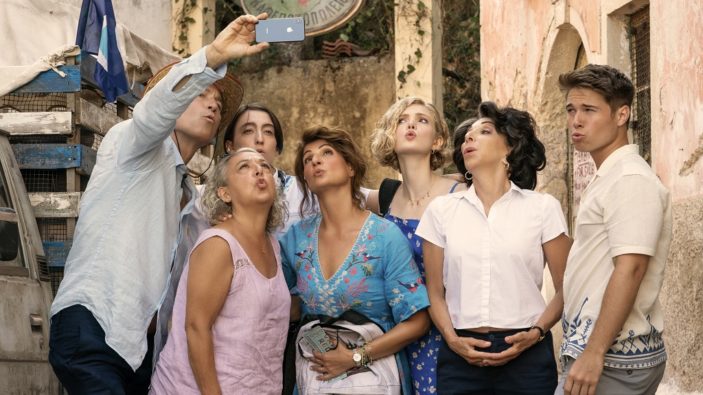
Nia Vardalos truly caught lightning in a bottle when it came to My Big Fat Greek Wedding in 2002. Produced on a miniscule $5m budget, it garnered favourable reviews from critics and audiences alike, eventually grossing over $365m globally; to this day it remains the highest grossing romantic comedy and, adjusted for inflation, the highest grossing film to never hit number 1 at the American box office.
Despite the film’s success, and Vardalos’s – it earned a Best Motion Picture – Musical or Comedy Golden Globe nomination, whilst she earned a Golden Globe nomination for Best Actress and an Academy Award nod for Best Original Screenplay – furthered projects surrounding her “Big Fat Greek” life weren’t as viable. There was a short-lived sitcom adaptation (2003’s My Big Fat Greek Life) that lasted only 7 episodes, and the 2016 film sequel, My Big Fat Greek Wedding 2, whilst financially fruitful ($90m off an $18m budget), paled in comparison and was received far more sourly from the critics.
But it seems you can’t keep a good Greek down, and whilst returns for each of her projects outside of Greek Wedding haven’t proven overtly successful for Vardalos as an actress, writer or director, the safety in returning to her character, Toula, is obviously too comfortable to pass, so here we are with the entirely unnecessary, but ultimately harmless, My Big Fat Greek Wedding 3, which sees Vardalos helming as both writer and, for the first time in the series, director.
Once again adhering to a farcical temperament surrounding the extended Portokalos clan, the film starts off on a more sombre note as it incorporates the real-life passing of Michael Constantine, the actor who played the family’s patriarch, Gus, for the first two films and the aforementioned sitcom; he passed in 2021, with the film’s first sequel serving as his final film role. Though a respectful note from Vardalos, unfortunately any sentimentality here is undone by the comical undertone present in the seeming on-set dementia diagnosis for her mother, Maria (Lainie Kazan). This isn’t a moment to make any type of jokes regarding the fact that this character is suffering in the aftermath of her husband’s passing, but the quips made throughout as she “pretends” to not know who her children are is worrying and entirely a misplaced bout of humour on Vardalos’s part as a writer.
Throughout all the “jokes” about what their mother can and can’t remember, Toula and her brother Nick (Louis Mandylor) vow to honour his dying wish and fly to his hometown in Greece to attend a reunion for all the Portokalos family members who moved away over the years. It’s a sweet gesture, and a voice-over from Toula speaks quite romantically at how it’s a tradition for Greek parents to give up their dreams in order for their children to thrive and travel, so her being able to visit the village her father never returned to adds a welcome sense of sentimentality that is sweet without being overtly sickly.
Of course, much like the misguided humour surrounding the mother’s illness, whatever sweetness could come from such a narrative as Toula visiting this village and vowing to show his journals to a trio of his childhood friends is undone by childish, simple “comedy” that, for the most part, feels unfinished or lazy. There’s a running joke about Nick always being tired and constantly grooming his body, but it’s never explained why; the genderless inclusion of Victory (Melina Kotselou), the town’s “mayor” and tour guide for the family, manages to initially not feel like an addition for the sake of being PC, until it absolutely does; and, despite his best efforts, it’s as if Vardalos forgot to give her on-screen husband, Ian (John Corbett), a character navigation of his own, so he’s inserted into the film’s overall arc of finding Gus’s old friends under the guise of it being his own journey.
Much like the first two films it’s the outspoken ways of Aunt Voula (Andrea Martin) and Freida (Maria Vacratsis) that liven up proceedings whenever it needs a true spark and, to a lesser extent here, Cousin Nikki (Gia Carides), who is sadly side-lined for the most of the picture, but manages a decent laugh or two with her confident strut and flirty nature; though, with Vardalos’s script reaching for anything of genuine comedic wealth, much of Martin and Vacratsis’s dialogue fails to match the organic delivery of the original film.
Ultimately, that’s really what it comes down to, that none of My Big Fat Greek Wedding 3 has a shred of naturality about it in the same way the original film did. There was a charm to the against-all-odds nature of Toula and Ian’s relationship that’s lost here. Yes, their marriage has been accepted by now, but they don’t bounce off each other in a manner fitting of people that have been together for 2 decades. And even this film’s attempt at a “Greek wedding” temperament with a couple overcoming their traditional borders – here it’s between one of Toula’s distant cousins and his Iranian girlfriend – never feels as if it’s weighted with anything resembling emotionality or stakes. It’s all so hollow and surface level.
Whilst not holding a candle to the original film, or, if I’m being honest, the series or sequel, there was the occasionally well executed quip throughout and, as much as I didn’t gel with it, the audience in tow seemed to lap it up far more enthusiastically. A film I suspect will be “critic proof” and is likely to be enjoyed by a certain demographic who enjoy shiny Greek locales and placid humour, My Big Fat Greek Wedding 3 is not an event I would personally RSVP for, but I know my spot at the table would be easily filled by a less-demanding guest.
![]()
![]()
![]()
![]()
![]()
TWO STARS (OUT OF FIVE)
My Big Fat Greek Wedding 3 is now screening in Australian theatres.
